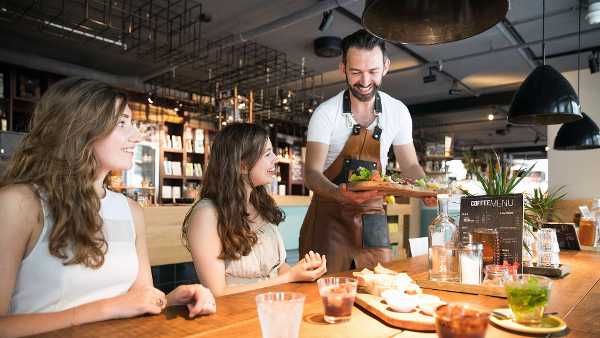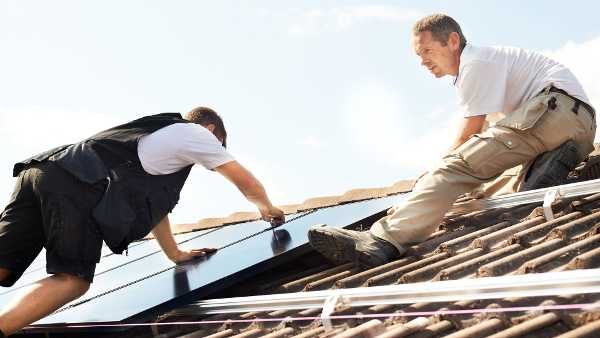How to start a sustainable hospitality business
- The basis
- 2 March 2023
- Edited 6 January 2025
- 7 min
- Starting
- Sustainability
Preparation is half the battle, especially if you are about to open a hospitality business. Before you launch your new restaurant, bar, or hotel, familiarise yourself with the sustainability rules you will have to meet. Take the rules on disposable plastics and preventing waste, as well as rules on energy use and sustainable delivery in zero-emissions zones. Doing it now will save you time, money, and effort later.
Sustainable business is becoming increasingly important. The earth is warming and the climate is changing. To minimise the negative consequences, more and more rules are being introduced to make Dutch businesses more sustainable. Moreover,55% of consumers are willing to pay more for environmentally friendly businesses. Sustainability is more than a requirement: it is a way to find and keep loyal customers.
Get your hospitality business off to a good start by making sustainable choices. Opt for organic or vegetarian ingredients, set up shop in an energy-efficient building, or embrace sustainable delivery.
There are several ways to get your business off to a sustainable start:
- Sustainable financing
- Sustainable business premises
- Sustainable transportation
- Waste, food waste, and zero plastic
- Making your product or service sustainable
- Green quality marks
Sustainable financing
Entrepreneurs looking to green their business can apply for the BMKB Groen (SME Credit Guarantee Green) scheme. Through this scheme, the government will stand as a guarantor for loans meant to green your business. This will reduce the risk for your lender and make it easier for you to borrow money.
Sustainable business premises
When you start looking for commercial properties, pay close attention to the energy label. A better energy label means a more economical building and a lower energy bill. New energy efficiency rules may be introduced in the future, targeting patio heating or air conditioning, for example. Municipalities like Amsterdam and Utrecht are investigating whether they can ban gas-powered patio heaters and air conditioning. There are also sustainable ways to keep your guests warm outdoors, such as heated cushions and blankets.
If you do end up purchasing a property with a poor energy label, you can still take energy efficiency measures yourself. That way, you will not have to remodel later. For example, investing in a heat pump and insulation. Proper insulation can help you lower your energy costs by as much as 30%. You can apply for grants to make your property more sustainable.
Renewable energy for your hospitality business
Gas-free business is set to become the default option in the Netherlands. By 2030, 1.5 million homes, offices, and shops should have transitioned away from natural gas. This was agreed in the National Climate Agreement of 2019. Buying a property? Install a sustainable heating system using a solar boiler or heat pump. Not only will it help lower your energy bill, but you will also get a €1,000 to €2,500 ISDE grant.
You can also use this ISDE grant to invest in renewable energy if you are taking over a hospitality business.
Ask an energy consultant
You can bring in an energy consultant to figure out the costs and potential yields of energy saving measures. They will provide tailor-made advice on how to become more sustainable, draw up an advisory report, and help you implement their recommendations. With requesting and assessing quotes, for example
Energy-saving measures for tenants
Do you rent a property? Talk to your landlord to discuss ways to make the building more sustainable. You can use this model letter from InRetail (in Dutch) to start the conversation. Lay down your agreements in your lease contract.
Energy-saving measures for hospitality businesses
The Climate Agreement contains various provisions about reducing carbon emissions. The Netherlands still has a lot of work to do if it is to reach its targets and entrepreneurs have to play their part. Greening measures will help you reduce your company’s carbon emissions whilst also lowering your energy bill.
Energy-saving obligation checker
The Wetchecker energiebesparing (Energy-saving obligation checker, in Dutch) helps you identify the measures you have to take to reduce your company's use of energy and CO2 emissions under the Energy-saving obligation.
Biggest energy guzzlers
Hospitality business owners often use large amounts of energy and gas. Figuring out where you are using the most energy can help provide insight into massive savings. Cooking on gas accounts for 67% of overall gas consumption. The biggest energy guzzler in the hospitality industry is the freezer (43%). Cooling systems, such as air conditioning and ventilation, account for only 2% of overall energy consumption, while exhaust systems are responsible for 14%. Remember that even small things like switching off your fridge lights can have a big impact. You can also save energy by turning off your appliances at night instead of leaving them on standby.
Gas-free cooking and heating
Cooking with electricity is economical and means you do not have to worry as much about fluctuating gas prices. More and more restaurants are opting for electric equipment (in Dutch). Gas-free cooking and baking also helps keep kitchen temperatures down (in Dutch). Especially in the summer, that will help to keep the cooling costs down.
Is your business based in an area set to be gas-free in 2030 ? Keep that in mind when purchasing your kitchen appliances. Consider an electrical stove or oven, an energy-efficient fridge, or an electric fryer, for instance. Thanks to the Energy-saving investment credit (EIA), you also pay less tax on sustainable equipment. With this scheme, you can deduct the expenses from your taxable profit.
Energy-saving obligation
More and more rules are being introduced that may affect your energy use. Business owners who use a lot of energy are required to take energy-saving measures. Does your commercial property use more than 50,000 kWh of electricity or more than 25,000 m3 of gas? Then you have to take all energy-saving measures that can be recouped within 5 years. You will have to start reusing residual heat from ovens and install timer switches, for instance.
Many restaurants and hotels in the Netherlands already comply with the energy-saving obligation. Perhaps it does not apply to your hospitality business (yet). However, even small-scale users can benefit from investing in energy-saving, sustainable measures. Your energy bill will be lower and you will be prepared for the future.
Duty to notify under the Energy-saving obligation
If the energy-saving obligation applies to you, you also have a duty of notification. Once every 4 years, you have to report what energy-saving measures you implemented. You can report what measures you have taken via the digital portal of the Netherlands Enterprise Agency RVO (in Dutch).
Sustainability grants
There are various grant and credit schemes for making your equipment and business processes more sustainable, such as the Environmental Investment Allowance (MIA), the Random depreciation of environmental investments scheme (Vamil) and the Energy Investment Allowance (EIA). In addition, several municipalities and provinces offer free energy scans (in Dutch) for hospitality entrepreneurs.
Sustainable transportation
Planning to deliver meals? As of 1 January 2025, several municipalities have installed zero-emission zones. And it is expected that others will follow. You can only enter a zero-emission zone if your car or van meets the required emissions standard. Before you buy a new car or van, check whether you will be able to enter the city centre with it.
Waste, food waste, and zero plastic
Business owners are required to separate waste. The rules for commercial waste differ from the rules for household waste. The Waste Separation tool tells you what waste to separate and how to go about it.
Food waste in the hospitality industry
Every year, people in the Netherlands waste two billion kilos of food. The hospitality industry is responsible for 14% of all food waste. Most food waste (70%) happens in the kitchen. It is common for chefs to purchase too many ingredients, for instance. On top of that, half of all prepared food ends up being thrown away. There are several ways to reduce food waste (in Dutch). Consider using fewer garnishes, for instance, or using leftovers to make sauces and soups. You can also join platforms like Too Good To Go. This lets you sell leftovers to customers near you. You can also think about donating food to the Voedselbank food bank (in Dutch).
Zero plastic in the hospitality industry
People in the Netherlands throw away 19 million plastic cups and units of food packaging every day. To turn the tide, the government has introduced legislation that means hospitality entrepreneurs must stop using single-use plastics.
Rules on free disposable plastic cups and containers
Since January 2024, you are no longer permitted to use disposable plastic cups and food packaging for consumption on the premises. This includes plastic containers in snack bars, or when serving food from a food truck at a festival. In a snack bar, for example, you can replace plastic containers, cups and cutlery with ceramic tableware.
On-site consumption
Since January 2024, you are no longer allowed to use disposable cups and containers for on-site consumption. Plastic trays in snack bars, for instance, or food served from a food truck at a festival. Snack bars can replace their plastic containers, cups, and cutlery, with reusable tableware.
Making your product or service sustainable
The food chain has a major impact (in Dutch) on the environment. Hospitality businesses can reduce their environmental impact by cooking (mostly) vegetarian food, for example. The number of vegetarians and vegans in the Netherlands is growing every year (in Dutch). A Thuisbezorgd.nl survey (in Dutch) has also revealed that the demand for vegetarian meals is increasing in restaurants and on delivery platforms. You can also shorten your supply chain by sourcing your ingredients locally. Use local Dutch products or source your products straight from farmers.
Green quality marks
A sustainable quality mark proves that your hospitality business is committed to sustainability. Green Key is the largest eco-label for the hospitality industry. This quality mark looks at various categories when assessing restaurants. Rating categories include energy use, waste management, sustainable menu items, and community involvement. Restaurants and hotels can also choose to be certified by the EKO-keurmerk Horeca.


